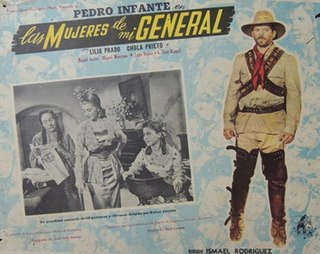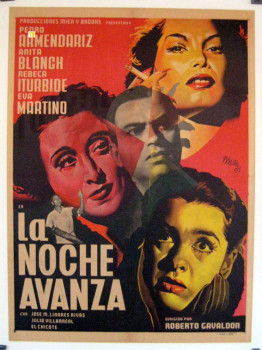Related Research Articles

María Antonia Abad FernándezMML, known professionally as Sara Montiel, also Sarita Montiel, was a Spanish actress and singer. She began her career in the 1940s and became the most internationally popular and highest paid star of Spanish cinema in the 1960s. She appeared in nearly fifty films and recorded around 500 songs in five different languages.
You're Missing the Point is a 1940 Mexican comedy film starring Cantinflas. It was produced by Jesús Grovas and directed by Juan Bustillo Oro, and also features Joaquín Pardavé, Sara García, Sofía Álvarez, and Dolores Camarillo. It was the twelfth film in Cantinflas's career, considered one of his best by Mexican film critics, as well as one of Mexico's best films.

Valente Quintero is a 1973 Mexican historical drama film directed by Mario Hernández and starring Antonio Aguilar in the title role. Saby Kamalich, Narciso Busquets, Sara García, Eleazar García, and Cornelio Reyna also star. The supporting cast includes Enriqueta Jiménez and Alejandro Reyna, among others. Flor Silvestre appears in a special musical performance.
El verdugo de Sevilla is a 1942 Mexican film. It stars Sara García and Fernando Soler. It is based on a play by Pedro Muñoz Seca. It was made as part of a series of Mexican films set in Spain in the 1940s, such as Dos mexicanos en Sevilla (1942). Its title is a reference to The Barber of Seville, an 18th-century French play by Pierre Beaumarchais.
A Family Like Many Others is a 1949 Mexican drama film directed by Alejandro Galindo and starring Fernando Soler, David Silva and Martha Roth. The film's sets were designed by the art director Gunther Gerszo.

Women's Prison is a 1951 Mexican drama film directed by Miguel M. Delgado and starring Miroslava, Sara Montiel and Katy Jurado. The film's sets were designed by the art director Gunther Gerszo.

My General's Women is a 1951 Mexican drama film directed by Ismael Rodríguez and starring Pedro Infante, Lilia Prado and Chula Prieto.

Sobre las olas is a 1950 Mexican musical biographical film directed by Ismael Rodríguez and starring Pedro Infante, Beatriz Aguirre and Andrés Soler. It portrays the life of the composer Juventino Rosas.

The Violet Seller, better known under its Spanish title La Violetera, is a 1958 Spanish–Italian historical jukebox musical film produced by Benito Perojo, directed by Luis César Amadori and starring Sara Montiel, Raf Vallone, Frank Villard, Tomás Blanco and Ana Mariscal.

The Night Falls is a 1952 Mexican crime film directed by Roberto Gavaldón and starring Pedro Armendáriz, Anita Blanch and Rebeca Iturbide. Armendariz delivers a particularly energetic performance.

The Beautiful Dreamer is a 1952 Mexican comedy film directed by Gilberto Martínez Solares and starring Germán Valdés, Lilia del Valle and Wolf Ruvinskis.
Your Memory and Me is a 1953 Mexican comedy drama film directed by Miguel M. Delgado.
El cuarto mandamiento is a 1948 Mexican drama film directed by Rolando Aguilar and starring Domingo Soler, Carmelita González, Sara Montes and Emma Roldán. The film's sets were designed by Manuel Fontanals. The film is about a family that is worried that their daughter is courted by a rich young man who likes the nightlife and luxury cars. The film is considered part of a group of family melodramas made in this period in which the dramatic tension revolves around old values, linked to a conservative order rooted in the past, which are pitted against new values associated with modernity, such as Cuando los hijos se van and A Family Like Many Others.
Beatriz Saavedra is a Mexican actress, best known for appearing in films such as Monte de piedad (1951), Tres hombres en mi vida (1952), Tío de mi vida (1952), It Happened in Acapulco (1953), La ladrona (1954), Madame X (1955), Drop the Curtain (1955), La doncella de piedra (1956), and La culta dama (1957).
Such Is My Country is a 1937 Mexican comedy film directed by Arcady Boytler and starring Antonio R. Frausto, Mercedes Soler, Juan José Martínez Casado, Manuel Medel, and Cantinflas. It was the first film to feature Cantinflas in a prominent role and the first of Cantinflas's films together with Medel as a team.
Fray Don Juan is a 1970 Mexican sex comedy film directed by René Cardona Jr. and starring Mauricio Garcés in dual roles, one as a priest and the other as a womanizer. It also stars Lorena Velázquez, Norma Lazareno, Gina Romand, Barbara Angely, and Luis Manuel Pelayo. It is one in a series of films that featured Garcés as an upper middle class ladies' man.
Modisto de señoras is a 1969 Mexican sex comedy film directed by René Cardona Jr., and starring Mauricio Garcés, Zulma Faiad, Irma Lozano, Claudia Islas and Patricia Aspíllaga. It is considered perhaps "the most popular and representative" of the series of films that featured Garcés as an upper middle class ladies' man.
References
- ↑ García Riera, Emilio (1990). Los hermanos Soler. Universidad de Guadalajara, Centro de Investigación y Enseñanza Cinematográficas. p. 177. ISBN 9789688950906.
- ↑ Garcia Berumen, Frank Javier (2003). Brown Celluloid: 1894-1959. Vantage Press. p. 343. ISBN 9780533143054.
- ↑ Hernandez-Rodriguez, R. (2009). Splendors of Latin Cinema. ABC-CLIO. p. 81. ISBN 9780313349782.